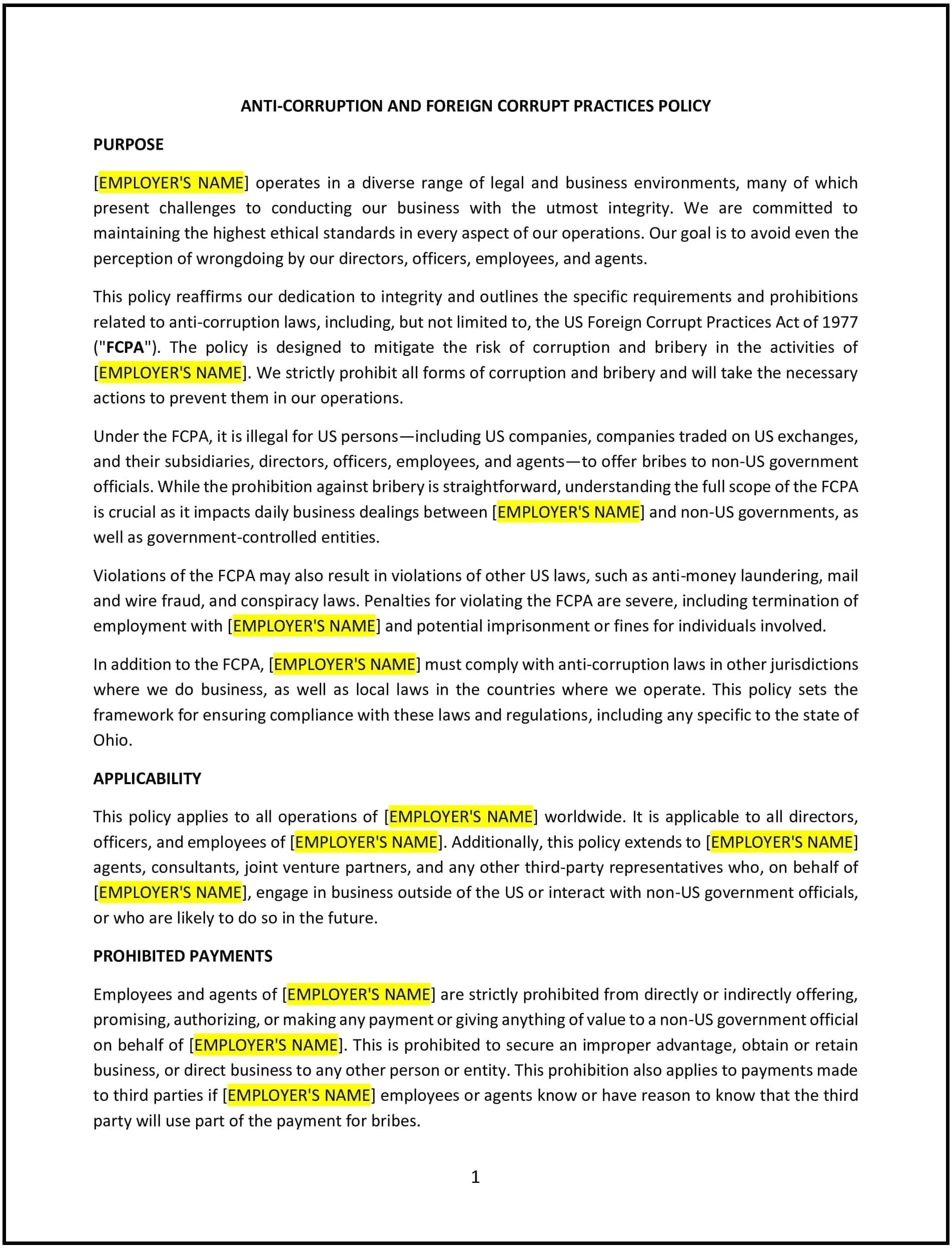Anti-corruption and foreign corrupt practices policy (Ohio): Free template
Got contracts to review? While you're here for policies, let Cobrief make contract review effortless—start your free review now.

Customize this template for free
Anti-corruption and foreign corrupt practices policy (Ohio)
An anti-corruption and foreign corrupt practices policy outlines the commitment of Ohio businesses to comply with both state and federal laws regarding corruption and bribery. This policy establishes clear guidelines prohibiting employees from offering, accepting, or soliciting bribes or kickbacks, either domestically or internationally, in connection with the company’s operations. It provides protocols for reporting suspected violations and describes the legal and business consequences of corruption. This policy also supports the business’s commitment to ethical conduct and corporate responsibility.
By implementing this policy, Ohio businesses can reduce the risk of corruption, improve their reputation for ethical behavior, and support compliance with applicable laws like the Foreign Corrupt Practices Act (FCPA) and Ohio state anti-corruption laws.
How to use this anti-corruption and foreign corrupt practices policy (Ohio)
- Define prohibited activities: Clearly outline the types of corrupt activities that are prohibited, such as bribing government officials, accepting kickbacks, or offering gifts to influence business decisions. The policy should address both domestic and international transactions and relationships.
- Establish reporting procedures: Specify the procedures for employees to report suspected corruption or unethical behavior, including anonymous reporting mechanisms. Ensure employees know where and how to report concerns safely without fear of retaliation.
- Set expectations for due diligence: Outline the business’s expectation for conducting due diligence in relation to third-party partners, vendors, and agents, ensuring they adhere to anti-corruption laws and ethical standards.
- Define gifts and entertainment guidelines: The policy should set clear boundaries for acceptable gifts and entertainment, ensuring that they are not used as a means of bribery or to unduly influence business decisions. The policy should include thresholds for permissible gifts and clear examples of unacceptable conduct.
- Establish consequences for violations: Specify the consequences for violating the policy, including disciplinary action, termination, or legal repercussions. The policy should make it clear that violations of the anti-corruption policy will be met with serious consequences.
- Promote transparency and accountability: Encourage transparency in business dealings, ensuring that all transactions are properly documented, monitored, and reported as required by law. The policy should emphasize accountability and compliance with ethical standards.
- Ensure compliance with Ohio state laws: The policy should comply with Ohio’s specific anti-corruption laws, in addition to federal regulations like the Foreign Corrupt Practices Act (FCPA), which prohibits bribery of foreign government officials.
- Review and update regularly: Periodically review and update the policy to reflect changes in Ohio state law, federal regulations, or the business’s operational practices.
Benefits of using this anti-corruption and foreign corrupt practices policy (Ohio)
This policy provides several key benefits for Ohio businesses:
- Promotes ethical business practices: By prohibiting corruption and bribery, businesses foster an environment of transparency and ethical behavior, which can enhance their reputation and strengthen their relationships with customers, clients, and partners.
- Reduces legal risks: Adhering to anti-corruption laws helps businesses avoid legal liabilities, including fines, penalties, and reputational damage from violating state or federal laws.
- Enhances regulatory compliance: A comprehensive anti-corruption policy ensures compliance with Ohio’s anti-corruption laws and the Foreign Corrupt Practices Act (FCPA), minimizing the risk of legal challenges and regulatory scrutiny.
- Improves business integrity: By fostering a culture of compliance and ethical behavior, businesses are better positioned to build trust with stakeholders, investors, and clients, which can lead to long-term success.
- Prevents financial and reputational damage: Preventing corruption helps mitigate the risk of financial losses or reputational damage that can occur from legal issues or unethical behavior.
- Strengthens relationships with third parties: By ensuring that third-party vendors, contractors, and agents adhere to anti-corruption standards, businesses reduce the risk of associations that could harm their reputation or violate legal requirements.
Tips for using this anti-corruption and foreign corrupt practices policy (Ohio)
- Communicate the policy clearly: Ensure all employees understand the anti-corruption policy by including it in the employee handbook, conducting regular training, and including information on how to report unethical behavior.
- Conduct regular training: Offer training sessions on the policy to ensure employees understand the consequences of corruption, how to recognize potential violations, and how to report concerns.
- Implement a thorough due diligence process: Establish due diligence procedures for vetting third-party partners, agents, and vendors, ensuring that they adhere to ethical standards and comply with anti-corruption laws.
- Monitor compliance: Regularly monitor business activities and financial transactions to ensure compliance with the policy. Establish mechanisms for auditing and investigating any potential violations.
- Encourage a speak-up culture: Create an environment where employees feel comfortable reporting suspected corruption or unethical behavior without fear of retaliation.
- Review the policy regularly: Periodically review the policy to ensure it remains in line with Ohio’s anti-corruption laws, federal regulations, and best practices. Make adjustments to the policy as needed based on changes in the law or business practices.